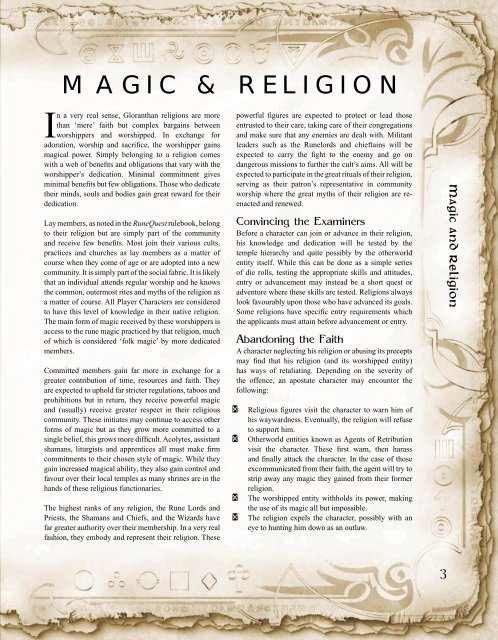Cults of G.. - Index of - Free
Cults of G.. - Index of - Free
Cults of G.. - Index of - Free
You also want an ePaper? Increase the reach of your titles
YUMPU automatically turns print PDFs into web optimized ePapers that Google loves.
MAGIC & RELIGION<br />
In a very real sense, Gloranthan religions are more<br />
than ‘mere’ faith but complex bargains between<br />
worshippers and worshipped. In exchange for<br />
adoration, worship and sacrifice, the worshipper gains<br />
magical power. Simply belonging to a religion comes<br />
with a web <strong>of</strong> benefits and obligations that vary with the<br />
worshipper’s dedication. Minimal commitment gives<br />
minimal benefits but few obligations. Those who dedicate<br />
their minds, souls and bodies gain great reward for their<br />
dedication.<br />
Lay members, as noted in the RuneQuest rulebook, belong<br />
to their religion but are simply part <strong>of</strong> the community<br />
and receive few benefits. Most join their various cults,<br />
practices and churches as lay members as a matter <strong>of</strong><br />
course when they come <strong>of</strong> age or are adopted into a new<br />
community. It is simply part <strong>of</strong> the social fabric. It is likely<br />
that an individual attends regular worship and he knows<br />
the common, outermost rites and myths <strong>of</strong> the religion as<br />
a matter <strong>of</strong> course. All Player Characters are considered<br />
to have this level <strong>of</strong> knowledge in their native religion.<br />
The main form <strong>of</strong> magic received by these worshippers is<br />
access to the rune magic practiced by that religion, much<br />
<strong>of</strong> which is considered ‘folk magic’ by more dedicated<br />
members.<br />
Committed members gain far more in exchange for a<br />
greater contribution <strong>of</strong> time, resources and faith. They<br />
are expected to uphold far stricter regulations, taboos and<br />
prohibitions but in return, they receive powerful magic<br />
and (usually) receive greater respect in their religious<br />
community. These initiates may continue to access other<br />
forms <strong>of</strong> magic but as they grow more committed to a<br />
single belief, this grows more difficult. Acolytes, assistant<br />
shamans, liturgists and apprentices all must make firm<br />
commitments to their chosen style <strong>of</strong> magic. While they<br />
gain increased magical ability, they also gain control and<br />
favour over their local temples as many shrines are in the<br />
hands <strong>of</strong> these religious functionaries.<br />
The highest ranks <strong>of</strong> any religion, the Rune Lords and<br />
Priests, the Shamans and Chiefs, and the Wizards have<br />
far greater authority over their membership. In a very real<br />
fashion, they embody and represent their religion. These<br />
powerful figures are expected to protect or lead those<br />
entrusted to their care, taking care <strong>of</strong> their congregations<br />
and make sure that any enemies are dealt with. Militant<br />
leaders such as the Runelords and chieftains will be<br />
expected to carry the fight to the enemy and go on<br />
dangerous missions to further the cult’s aims. All will be<br />
expected to participate in the great rituals <strong>of</strong> their religion,<br />
serving as their patron’s representative in community<br />
worship where the great myths <strong>of</strong> their religion are reenacted<br />
and renewed.<br />
Convincing the Examiners<br />
Before a character can join or advance in their religion,<br />
his knowledge and dedication will be tested by the<br />
temple hierarchy and quite possibly by the otherworld<br />
entity itself. While this can be done as a simple series<br />
<strong>of</strong> die rolls, testing the appropriate skills and attitudes,<br />
entry or advancement may instead be a short quest or<br />
adventure where these skills are tested. Religions always<br />
look favourably upon those who have advanced its goals.<br />
Some religions have specific entry requirements which<br />
the applicants must attain before advancement or entry.<br />
Abandoning the Faith<br />
A character neglecting his religion or abusing its precepts<br />
may find that his religion (and its worshipped entity)<br />
has ways <strong>of</strong> retaliating. Depending on the severity <strong>of</strong><br />
the <strong>of</strong>fence, an apostate character may encounter the<br />
following:<br />
D Religious figures visit the character to warn him <strong>of</strong><br />
his waywardness. Eventually, the religion will refuse<br />
to support him.<br />
D Otherworld entities known as Agents <strong>of</strong> Retribution<br />
visit the character. These first warn, then harass<br />
and finally attack the character. In the case <strong>of</strong> those<br />
excommunicated from their faith, the agent will try to<br />
strip away any magic they gained from their former<br />
religion.<br />
D The worshipped entity withholds its power, making<br />
the use <strong>of</strong> its magic all but impossible.<br />
D The religion expels the character, possibly with an<br />
eye to hunting him down as an outlaw.<br />
3<br />
Magic and Religion



